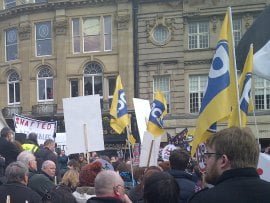Around 1000 people joined the Newcastle Stop the Cuts “Save our Services” march and rally on Saturday 16th February. The demonstration was the latest stage of the campaign to fight Newcastle City Council’s budget plans, which will mean the closure of several libraries, the extinction of Play and Youth Services and cuts of 48% to Arts funding, as well as a long list of other service cuts.
Around 1000 people joined the Newcastle Stop the Cuts “Save our Services” march and rally on Saturday 16th February. The demonstration was the latest stage of the campaign to fight Newcastle City Council’s budget plans, which will mean the closure of several libraries, the extinction of Play and Youth Services and cuts of 48% to Arts funding, as well as a long list of other service cuts.
Some 1300 jobs are set to go over the next three years as the Council’s Labour leadership carries out £100 million of cuts. The scale of the cuts and the way they have imposed has generated big opposition already. 500 attended a lobby of the cabinet just before Christmas and 400 attended a meeting to oppose the attacks on the Library service in January.
UNISON, PCS and RMT banners were much in evidence (the RMT on Tyneside are currently involved in a 7 day strike of cleaners on the Tyneside Metro). There was also a delegation from the AEI workers in Birtley, who were involved in a bitter campaign after they were made redundant a couple of years ago, and there was also a large number of council workers and their families, service users, and campaign groups in evidence.
The demonstration gridlocked the City Centre as the marchers headed first to the Civic Centre and then on to Grey’s Monument via Northumberland Street, the main shopping street in the City. Newcastle City Council plays a huge role economically in the local economy and £100 million in cuts will have a dramatic effect on jobs and businesses in the area.
The Save the Libraries campaign in Newcastle has played an important role in galvanizing opposition to the cuts – opposition which could develop given a clear political lead. If one Labour group in one City refused to carry out the Coalition’s cuts, then this could become a beacon for the whole of the public sector. Various speakers talked about the battles over cuts in the 1980’s and also the example of the Poplar councillors in the 1920’s. The opposition to the cuts in Newcastle and throughout the north east won’t go away. This is just the beginning.






